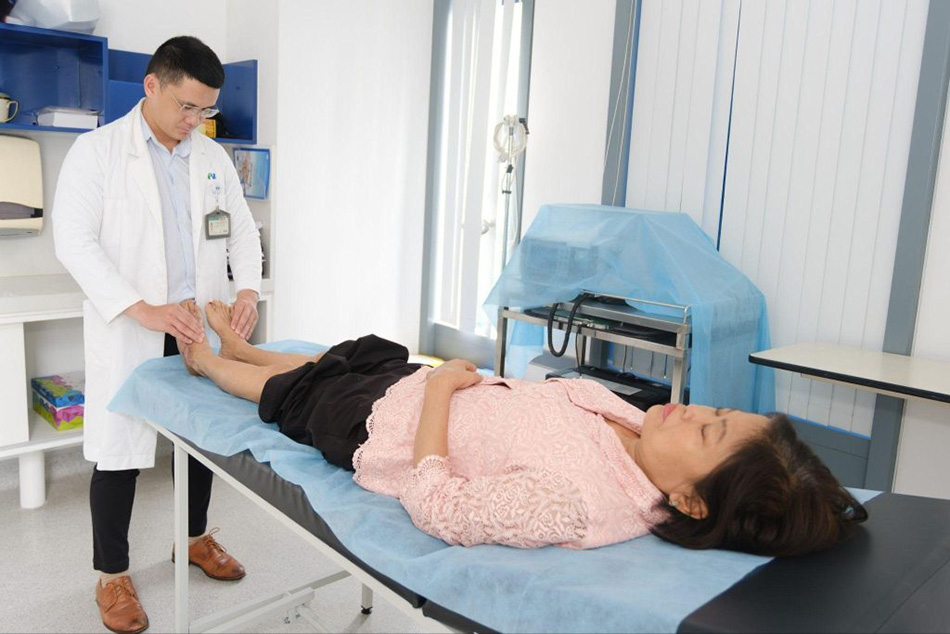Ms Tan Chheang Lay (62 years old, from Cambodia)’s foot was severely infected due to complications from diabetes, and she was advised to have an amputation. Unwilling to live with a disability, she sought help from the doctors at FV Hospital. Over the course of three months, a multidisciplinary medical team at FV worked together to successfully save her foot.
An emotional Ms Tan told us, “Keeping my foot has greatly improved my quality of life and daily activities! The doctors at FV are truly amazing!”
Undergoing Three Surgeries to Save a Diabetic Foot Complicated by Diabetes
Ms Tan had been living with diabetes for over 30 years. In early 2024, she developed a small abscess on her left foot. Since she didn’t feel any pain, she assumed it was just a minor scratch. However, the abscess quickly worsened. After receiving treatment at a local hospital, her condition didn’t improve, and the doctors were forced to amputate her little toe.
Despite the surgery, the infection continued to spread throughout her foot. She sought further medical advice at a higher-level hospital, where doctors recommended a leg amputation, warning that the infection would continue to spread and endanger her life. Determined to avoid permanent disability, she followed the advice of an acquaintance and sought treatment at FV Hospital, hoping to save her foot.
Upon examining Ms Tan, Dr Truong Hoang Vinh Khiem, Bone & Joint Centre at FV Hospital, recognised that the infection was extremely severe.

“Treating diabetic foot is a major challenge for doctors. The difficulty in this case lies in the lack of blood supply to the limbs, which means the wound heals very slowly. The surgery also requires experienced doctors to remove the damaged tissue without affecting the healthy surrounding tissue,” said Dr Khiem. Moreover, this treatment needed close collaboration between multiple departments within the hospital.
Fortunately, after checking the ABI index (ankle-brachial pressure index), Dr Nguyen Thi Thu Huong – Endocrinology Department of FV Hospital assessed that the blood vessels in the foot were still in a relatively good condition, which increases the likelihood of the wound healing.
Ms Tan and her family agreed to the “multiple surgeries” option proposed by Dr Khiem. His team performed three meticulous surgeries for her. The first two surgeries were to remove all the infected tissue in the area. In the third surgery, Dr Khiem transferred skin from the patient’s calf to cover the area of necrotic skin loss. Ms Tan received wound care combined with medication prescribed by the doctors from the Endocrinology Department to balance her blood sugar and help her to regenerate new tissue in the affected area.
The post-operative care process after the skin graft surgery was a significant challenge for the nursing team. The patient had to remain in a fixed position for two weeks. The nurses at FV Hospital creatively found ways to make the patient more comfortable by creating support pillows, regularly adjusting her position, and providing massages. After being discharged, Ms Tan continued follow-up visits 2-3 times per week for over two months, where Dr Khiem personally cared for her wound.
Nutrition also played a crucial role in her post-surgery recovery. The FV nursing team diligently supported Ms Tan, ensuring she followed the nutritional plan provided by the dietician. Thanks to the close collaboration between the different medical departments, the nursing staff, and Ms Tan’s active cooperation, she was able to avoid amputation.

In her follow-up appointment at the end of July 2024, Ms Tan was overjoyed to find that her wound had healed, and she could walk normally. “Keeping my foot has greatly improved my quality of life and daily activities! The doctors at FV Hospital are truly amazing!” Ms Tan said emotionally.
It’s important to regularly check your feet and have routine check-ups.
On average, around the world, a patient with diabetes undergoes amputation every 30 seconds.
According to Dr Nguyen Thi Thu Huong from the Endocrinology Department at FV Hospital, patients with Charcot foot (diabetic foot) are at a significantly higher risk of infection compared to healthy individuals. This complication often begins to manifest in the early stages without clear symptoms, and sometimes the patients themselves are unaware that they are suffering from it,” Dr Huong warns. She advises patients to examine their feet daily to promptly identify any calluses or small cuts for timely treatment.


Complications related to diabetic foot are caused by poor blood sugar control. Diabetic patients need to have regular check-ups to receive appropriate prescriptions for blood sugar management, follow dietary guidelines, and engage in suitable physical activity to prevent complications from this chronic condition.
To consult and address diabetic foot complications, please contact FV Hospital at: 02854113333.



